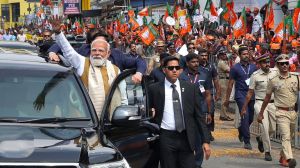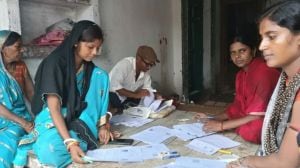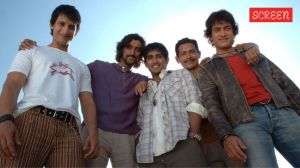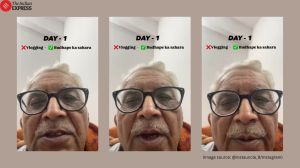Call it democracy fatigue
Could the massive anti-Thaksin street protests ahead of Thailand8217;s snap general election underscore a growing disillusionment with democracy in Asia?

It might look as if history were repeating itself: just as in the 1970s, 8217;80s and 8217;90s, defiant protesters have taken to Bangkok8217;s streets in a bid to oust a Thai leader they revile. Yet this time their nemesis isn8217;t a swaggering general who seized power in a coup, but a populist prime minister who won re-election in a landslide barely a year ago. Thaksin Shinawatra, say his critics, has abused state power to enrich himself and undermine representative government. But that doesn8217;t negate the irony on display as self-professed democrats attempt to oust a still-popular elected leader 8212; with force, not votes. 8220;It8217;s the only way to fight a tyrant,8221; says anti-Thaksin political analyst Chaiyan Chaiporn.
What about elections? Thaksin has called a snap vote for this Sunday 8212; yet, knowing he8217;d win handily rural Thais remain steadfastly loyal, the three main opposition parties have opted to boycott the contest and even appealed to Thailand8217;s revered monarch, King Bhumibol Adulyadej, to name a new leader. Their frustration with the electoral system has echoes across the region8217;s youngest democracies. Protesters in the Philippines have similarly sought to oust an elected president, and even in South Korea and Taiwan, voters are increasingly tuning out of a shrill and deadlocked political culture. Indeed, what Chu Yun-han, professor of political science at National Taiwan University NTU, calls 8220;democracy fatigue8221; is spreading from Seoul to Jakarta.
The disillusionment has grown because the social improvements people dreamed of when first casting their votes haven8217;t materialised. The East Asian Barometer, an annual comparative study of political attitudes in 10 East Asian nations, has recorded consistent dissatisfaction with democratic governance since 2001. According to a recent poll, just 41 per cent of respondents in Taiwan, and 49 per cent in South Korea, agree that 8220;democracy is the best system under all circumstances8221;. In the Philippines and Thailand, 8220;sympathy for authoritarian alternatives8221; runs so high, says Chu, that democracy rests 8220;on a rather fluid and fragile foundation8221;.
Part of the problem is that elections have in many cases failed to produce cleaner, fairer governance. In the Philippines, Gloria Macapagal Arroyo has never come clean about her role in a 2004 vote-rigging scandal despite an opposition-led impeachment drive and the resignation of key ministers in protest. That led to a recent coup attempt the nation8217;s ninth since dictator Ferdinand Marcos fled the country in 8217;86 and talks for her to resign. Many of those calling for her early departure picture themselves as champions of democracy.
Where elections have been close or contested, as in the US in 2000, politics have also become nastily partisan. In Taiwan, President Chen Shui-bian8217;s narrow re-election triumph in 2004, just one day after he was shot and slightly injured in an assassination attempt, has spawned a cottage industry of conspiracy theories. 8220;Before the election, there was enough mistrust already. And many people were hoping, after the election, we could start over,8221; says NTU political scientist Huang Chang-ling. 8220;But the shooting and controversy afterward made things even worse.8221; So has media sensationalism: much of what fills TV airtime in Taiwan are politicians playing to the cameras over minor disputes. 8220;The smaller the differences, the fiercer the fight,8221; says Shelley Rigger, a Taiwan expert from Davidson College in North Carolina.
While the West is no stranger to such vitriolic partisanship, Asia8217;s young democracies are still plagued by relatively immature political institutions. Since military rule ended in the 1980s, for instance, South Korea has enacted laws befitting a modern democracy. Yet experts say that politics remains hamstrung by a culture guided by charismatic figures and a 8220;gotcha8221; media culture. 8220;On the surface, Korean democracy has improved greatly over the past two decades,8221; says Lee Jung Hee, a political scientist in Seoul. 8220;But in reality, it is still mired in the old political paradigm of empty promises appealing to shallow emotions.8221; The country8217;s prime minister, Lee Hae Chan, resigned this month after being spotted playing golf with allegedly corrupt businessmen.
Voter turnout still remains high everywhere, but public cynicism runs deep. In Thailand, the middle-class protesters furious at Thaksin simply don8217;t trust elections to produce good leaders. Media mogul Sondhi Limthongkul, a key member of the anti-Thaksin alliance, believes the rural Thais who form the backbone of Thaksin8217;s support are too uneducated and easily manipulated to be allowed to choose the country8217;s next leader.
The campaign to oust Thaksin, driven by Bangkok8217;s middle and upper classes, has thus taken on undertones of a class war. If balloting goes ahead this weekend, the poor are likely to vote in large numbers, and largely for the prime minister. But the opposition8217;s boycott could push voter turnout low enough that many pro-Thaksin candidates fail to garner ballots from 20 per cent of eligible voters, the legal threshold to claim seats in Parliament. That could force another election, or more demonstrations on Bangkok8217;s streets. Either way, the partisan split will be deepened, and the ultimate casualty could be democracy itself. 8220;People in other countries protest for elections, but here they are protesting against elections,8221; observes Chayachoke Chulasiriwongs, a lecturer at Chulalongkorn University. They should be careful what they wish for.
GEORGE WEHRFRITZ and JOE COCHRANE
- 01
- 02
- 03
- 04
- 05































